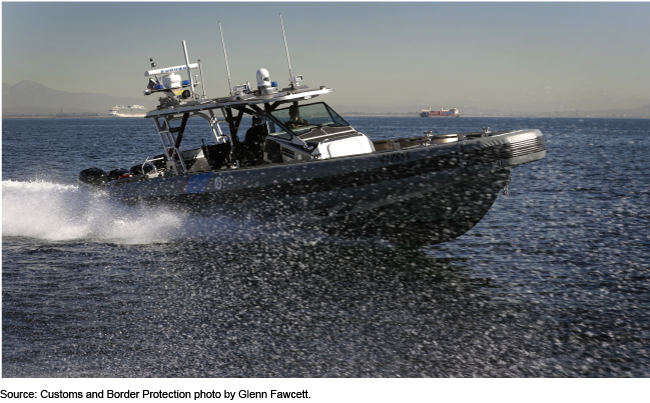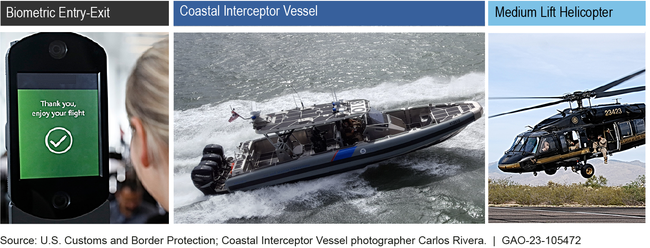Customs and Border Protection: Actions Needed to Enhance Acquisition Management and Knowledge Sharing
Fast Facts
U.S. Customs and Border Protection invests billions of dollars each year on systems like software and boats to support its missions. But CBP's purchases have frequently cost more and taken longer to arrive than expected. Using lessons learned from past mistakes may help CBP keep future programs on track.
We looked at 10 CBP acquisition programs and found that they didn't consistently collect or share lessons learned from past projects. Doing so could help the agency avoid repeating mistakes in the future. CBP should also improve its acquisition guidance for contracting officers and program officials.
Our recommendations address these issues.
Customs and Border Protection Coastal Interceptor

Highlights
What GAO Found
U.S. Customs and Border Protection (CBP) acquires systems—including software, marine vessels, and aircraft—to protect Americans from terrorism, secure U.S. borders, and facilitate lawful trade, among other missions.
Examples of U.S. Customs and Border Protection Acquisition Programs

A number of key stakeholders collaborate to manage CBP's acquisition programs. Yet recent changes to the Department of Homeland Security's (DHS) policy have reduced formal involvement of one stakeholder—the contracting officer. Prior to the policy change, CBP contracting officers had a defined role in developing acquisition strategies through program-level acquisition plans, which were intended to discuss the overall strategy for relevant contracts supporting the program. Now, CBP contracting officers GAO spoke with coordinate with program managers on a contract-by-contract basis. Moreover, CBP has not yet updated its guidance to define the role contracting officers should have in developing program-level acquisition strategies. Doing so would help ensure that contracting officers are involved in ensuring that an acquisition program's overall contracting approach aligns with program goals and risks that may otherwise be obscured at the individual contract level.
CBP does not consistently demonstrate leading practices for lessons learned when developing acquisition programs. Lessons learned can be a valuable tool for evaluating the success or failure of a program and for applying those lessons to future efforts. CBP requires programs to conduct activities—such as post-implementation reviews—that can capture lessons learned. But the programs GAO reviewed did not consistently conduct these activities or collect, analyze, and validate these lessons learned. Updating guidance to require that programs' lessons learned are consistently collected, analyzed, and validated will help to ensure that CBP has identified root causes and appropriate actions to address them, and determined the applicability of lessons learned to other programs. GAO also found that, while CBP has taken some steps to share lessons learned, it does not have a formal process or a repository in place to consistently archive and share them. Without consistently archiving and sharing lessons learned, CBP is at risk of missing opportunities to improve its planning for similar acquisition programs and of losing lessons learned that could inform future acquisition programs.
Why GAO Did This Study
CBP—a component of DHS—invests billions of dollars each year acquiring systems to support its missions. GAO and DHS reviews have found CBP is not consistently meeting its acquisition programs' cost and schedule goals, and is deploying capabilities that are not fully tested.
GAO was asked to review CBP's processes for planning and managing its acquisition programs. This report assesses, among other objectives, the extent to which (1) key CBP stakeholders are collaborating when planning selected acquisition programs, and (2) CBP demonstrates lessons learned practices when developing acquisition programs.
GAO reviewed acquisition policies and guidance and selected a nongeneralizable sample of 10 programs based on the programs' acquisition level and type, among other factors. For those programs, GAO reviewed documentation and lessons learned and interviewed acquisition and contracting officials. GAO assessed CBP's efforts against leading practices for collaboration and lessons learned identified in prior GAO work.
Recommendations
GAO is making four recommendations to CBP, including to update guidance; to formalize contracting officer involvement in program acquisition strategies; to collect, analyze, and validate lessons learned; and to develop a lessons learned repository. DHS agreed with these recommendations.
Recommendations for Executive Action
| Agency Affected | Recommendation | Status |
|---|---|---|
| United States Customs and Border Protection | The CBP Commissioner should update acquisition guidance, such as the PLP Guide, to accurately reflect how key governance councils are conducting portfolio management. (Recommendation 1) |
DHS did not agree with this recommendation but stated in its April 2023 response to our report that the CBP Office of Acquisitions would take action to update its PLP Guide to clarify the concept of portfolio management and how it should be executed within CBP. CBP officials also stated the Office of Acquisitions is determining whether updates are needed for CBP's established governance council charters. CBP officials completed the updates to the PLP Guide in May 2025. However, our review of the guide did not identify changes related to the discrepancies we identified in how some entities are involved in portfolio management practices. CBP officials told us they expect to make additional edits to the PLP Guide to account for changes in DHS-wide acquisition management policies. We will continue to follow-up on CBP's efforts to address this recommendation.
|
| United States Customs and Border Protection | The CBP Commissioner should ensure that the Component Acquisition Executive updates guidance to require that contracting officers be included in the development of information summarized in DHS's Acquisition Strategy Document, to ensure contracting officers have knowledge of and are involved in developing program-level acquisition strategies. (Recommendation 2) |
DHS agreed with this recommendation and said CBP would update two key acquisition policy documents to reflect updates from DHS policy and provide additional CBP guidance to ensure contracting officers have knowledge of, and are involved in, developing program-level acquisition strategies. While CBP officials did finalize the updates to those policy documents in May 2025, we found no language in the updated documents that would ensure contracting officers have knowledge of, and are involved in, developing program-level acquisition strategies. CBP officials told us they expect to make additional edits to the PLP Guide to account for changes in DHS-wide acquisition management policies. We will continue to follow-up on CBP's efforts to address this recommendation.
|
| United States Customs and Border Protection | The CBP Commissioner should ensure that the CBP Component Acquisition Executive updates acquisition guidance to require CBP to collect, analyze, and validate acquisition programs' lessons learned throughout the acquisition life cycle. (Recommendation 3) |
DHS agreed with this recommendation and stated that CBP would update two key acquisition policy documents with guidance to ensure CBP collects, analyzes, and validates acquisition programs' lessons learned throughout the acquisition life cycle. The officials further stated that CBP acquisition officials have reviewed the current process for tracking lessons learned and made updates to the tracking file. While CBP officials did finalize the updates to those policy documents in May 2025, we found no language in the updated documents about analyzing or validating lessons learned, or that the process of updating lessons learned should happen throughout a program's acquisition lifecycle. CBP officials told us they expect to make additional edits to the PLP Guide to account for changes in DHS-wide acquisition management policies. We will continue to track CBP's efforts to address this recommendation.
|
| United States Customs and Border Protection | The CBP Commissioner should ensure that the CBP Component Acquisition Executive develops a central repository for acquisition programs to archive and share lessons learned. (Recommendation 4) |
DHS agreed with this recommendation and said that CBP would update two key acquisition policy documents with guidance to ensure there is a central repository for acquisition programs to archive and share lessons learned within the acquisition community. The officials further stated that CBP will continue to communicate lessons learned in regularly scheduled portfolio reviews, which are open to the CBP acquisition community. CBP officials finalized the updates to those two key policy documents in May 2025. These policy documents state the CBP Office of Acquisitions will maintain a listing of lessons learned from various CBP acquisition programs that can be reviewed by program managers and applied to various new or ongoing efforts. However, the lessons learned CBP provided to us in September 2025 were the same as the ones provided during the course of our review. CBP officials told us at that time that they are in the process of refining and expanding their lessons learned efforts. We will continue monitor their efforts towards addressing this recommendation.
|
